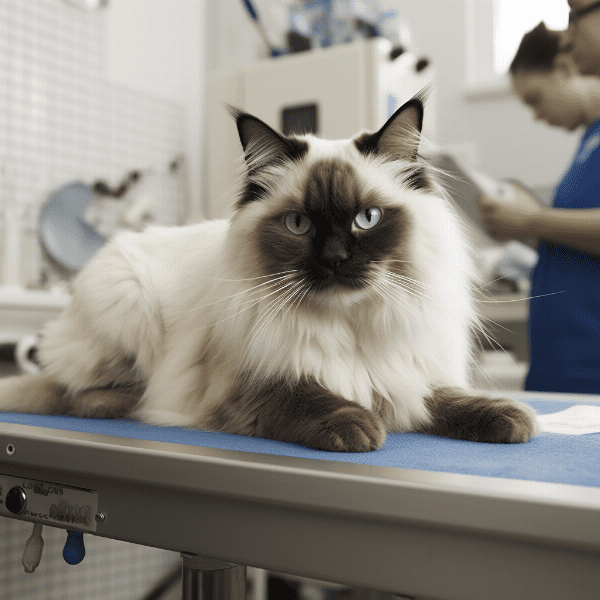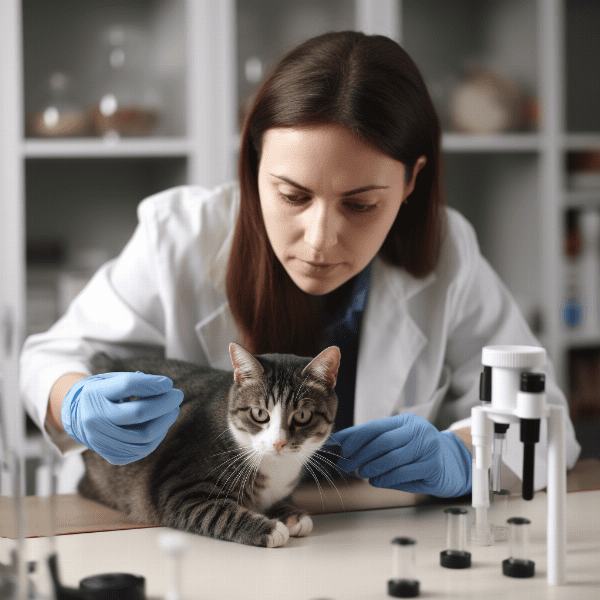Table of Contents
- Introduction to Siamese Cat Genetics
- Common Genetic Disorders in Siamese Cats
- Symptoms and Diagnosis of Siamese Cat Genetic Disorders
- Treatment Options for Siamese Cat Genetic Disorders
- Preventing Siamese Cat Genetic Disorders through Breeding
- Lifestyle Changes for Siamese Cats with Genetic Disorders
- Research Advances in Siamese Cat Genetic Disorders
- Supporting Siamese Cats with Genetic Disorders
- Coping with the Loss of a Siamese Cat to Genetic Disorders
- Conclusion: The Importance of Understanding Siamese Cat Genetics
Introduction to Siamese Cat Genetics
How Genes are Inherited in Siamese Cats
Siamese cats, like all mammals, inherit their genes from their parents. Each cat has two copies of each gene – one from their mother and one from their father. Some genes are dominant, meaning that if a cat has even one copy of the gene, they will express the trait it codes for. Other genes are recessive, meaning that a cat must inherit two copies of the gene – one from each parent – in order to express the trait.
Physical Traits Determined by Siamese Cat Genetics
Siamese cat genetics play a significant role in determining a cat’s physical traits, such as their coat color, pattern, and eye color. The distinctive coat pattern of Siamese cats is caused by a gene that affects the production of melanin, the pigment that gives color to hair and skin. The gene is temperature-sensitive, meaning that it is only expressed in certain areas of the body where the temperature is cooler, such as the ears, tail, and face.
Siamese cats also have a unique eye color that is a result of their genetics. The blue eyes of Siamese cats are caused by a gene that dilutes the color of the iris. This gene is also temperature-sensitive, which is why Siamese cats have blue eyes but other breeds with the same gene do not.
Genetic Disorders in Siamese Cats
Unfortunately, Siamese cats are prone to several genetic disorders, including a range of diseases and conditions that can impact their health and well-being. Some of the most common genetic disorders in Siamese cats include:
- Progressive Retinal Atrophy (PRA)
- Amyloidosis
- Congenital Heart Disease
- Asthma
- Dental Problems
In the following sections, we will explore each of these disorders in more detail and discuss the symptoms, diagnosis, and treatment options available for Siamese cats with these conditions.

Common Genetic Disorders in Siamese Cats
Progressive Retinal Atrophy (PRA)
Progressive Retinal Atrophy (PRA) is a degenerative eye disorder that can cause blindness in Siamese cats. It is caused by the gradual deterioration of cells in the retina, which leads to vision loss. Symptoms of PRA include night blindness, dilated pupils, and a reduced ability to see in low light conditions. Unfortunately, there is no cure for PRA, but early diagnosis can help slow the progression of the disease and improve the cat’s quality of life.
Amyloidosis
Amyloidosis is a condition where a protein called amyloid accumulates in the body’s tissues and organs. In Siamese cats, it is most commonly found in the liver and can cause liver failure. Symptoms of amyloidosis include weight loss, loss of appetite, and jaundice. Treatment options for amyloidosis include supportive care, such as fluids and nutrition, as well as medication to manage symptoms.
Congenital Heart Disease
Congenital heart disease is a broad term used to describe a range of heart defects that are present at birth. In Siamese cats, congenital heart disease is most commonly caused by a defect in the heart’s valves or chambers. Symptoms of congenital heart disease include difficulty breathing, coughing, and lethargy. Treatment options for congenital heart disease depend on the specific defect and may include medication or surgery.
Asthma
Asthma is a respiratory condition that can cause difficulty breathing in cats. It is caused by inflammation in the airways, which can lead to coughing, wheezing, and shortness of breath. Siamese cats are particularly prone to asthma, and it is often triggered by environmental factors such as dust, pollen, or cigarette smoke. Treatment options for asthma in cats include medication to manage symptoms and environmental management to reduce triggers.
Dental Problems
Dental problems are a common issue in cats, and Siamese cats are no exception. Some of the most common dental problems in Siamese cats include gum disease, tooth decay, and tooth loss. Symptoms of dental problems in cats can include bad breath, drooling, and difficulty eating. Treatment options for dental problems in cats include regular dental cleanings and treatments, as well as providing appropriate dental care at home.
In conclusion, while Siamese cats are a popular and beloved breed, they are susceptible to a range of genetic disorders that can impact their health and well-being. Understanding these disorders and their causes, symptoms, and treatment options can help cat owners provide the best possible care for their feline companions.
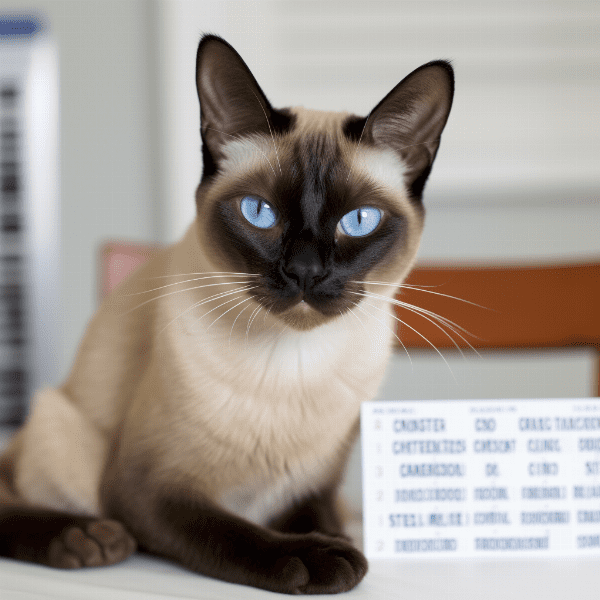
Symptoms and Diagnosis of Siamese Cat Genetic Disorders
Symptoms of Siamese Cat Genetic Disorders
The symptoms of Siamese cat genetic disorders can vary depending on the specific disorder and its severity. However, some common symptoms to look out for include:
- Vision loss or blindness
- Weight loss or gain
- Loss of appetite
- Vomiting or diarrhea
- Lethargy or weakness
- Difficulty breathing or coughing
- Dental problems, such as bad breath or tooth loss
If you notice any of these symptoms in your Siamese cat, it is important to take them to the veterinarian for an evaluation. Early diagnosis and treatment can improve the cat’s quality of life and may even save their life.
Diagnosis of Siamese Cat Genetic Disorders
Diagnosing Siamese cat genetic disorders can be challenging, as many of these conditions have similar symptoms. The diagnosis process may include a physical exam, blood work, imaging tests such as X-rays or ultrasounds, and genetic testing.
In some cases, a biopsy may be necessary to confirm a diagnosis. For example, if a Siamese cat is suspected to have amyloidosis, a biopsy of the liver tissue can confirm the presence of amyloid protein.
In conclusion, Siamese cats are susceptible to a range of genetic disorders that can impact their health and well-being. Understanding the symptoms of these disorders and the diagnosis process is essential for providing the best possible care for your feline companion. If you suspect your Siamese cat may have a genetic disorder, don’t hesitate to seek veterinary care. Early diagnosis and treatment can make a significant difference in their quality of life.
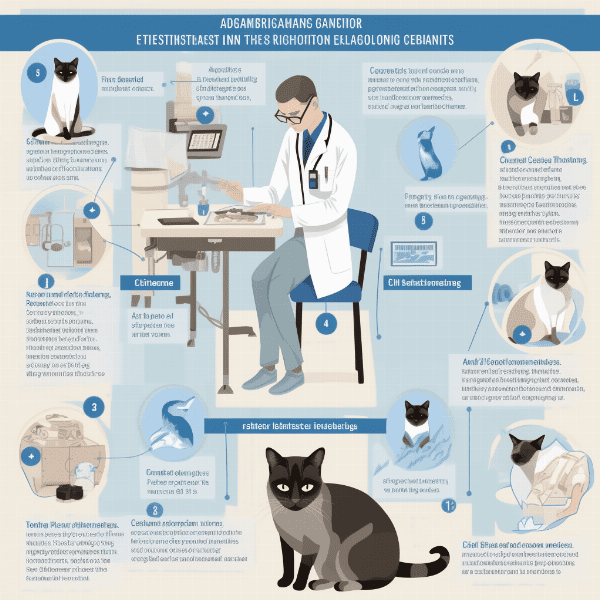
Treatment Options for Siamese Cat Genetic Disorders
Medications
In many cases, medications can help manage the symptoms of Siamese cat genetic disorders. These medications may include pain relievers, anti-inflammatory drugs, or other medications to manage specific symptoms such as coughing or vomiting.
For example, if a Siamese cat has asthma, they may be prescribed medications to manage inflammation in the airways and prevent symptoms.
Surgery
In some cases, surgery may be necessary to treat Siamese cat genetic disorders. This may involve removing a tumor, repairing a heart defect, or correcting a dental problem.
For example, if a Siamese cat has congenital heart disease, surgery may be necessary to repair or replace a heart valve.
Genetic Counseling and Breeding
For some genetic disorders, genetic counseling and breeding may be a potential treatment option. This involves working with a veterinarian or genetic counselor to understand the genetic basis of the disorder and make informed decisions about breeding.
For example, if a Siamese cat has a genetic disorder such as PRA, breeders may choose to avoid breeding cats that are carriers of the gene to reduce the risk of passing the disorder on to their offspring.
In conclusion, Siamese cats are susceptible to a range of genetic disorders that can impact their health and well-being. Understanding the treatment options available for these conditions can help cat owners provide the best possible care for their feline companions. If you suspect your Siamese cat may have a genetic disorder, it is important to work closely with a veterinarian to develop an appropriate treatment plan. With proper care and treatment, many Siamese cat genetic disorders can be managed successfully, allowing these beloved cats to live happy and healthy lives.
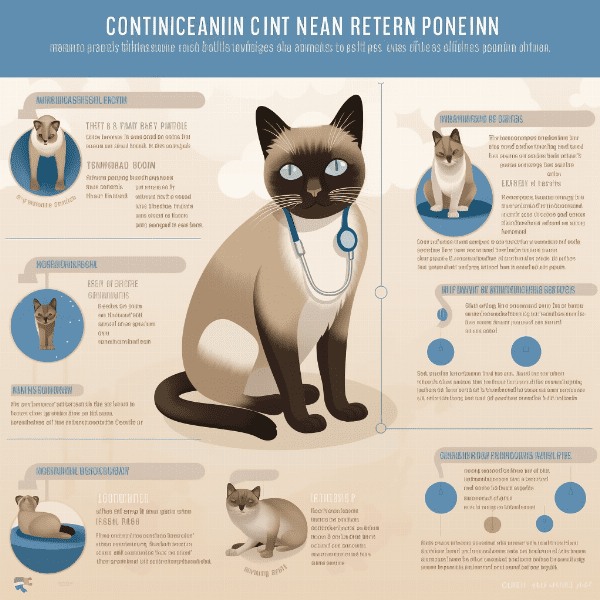
Preventing Siamese Cat Genetic Disorders through Breeding
Responsible Breeding Practices
Responsible breeding practices are essential for preventing Siamese cat genetic disorders. This includes avoiding breeding cats with known genetic disorders, as well as carefully selecting breeding pairs based on their genetics and health.
Breeders should also be aware of the risks associated with inbreeding and work to maintain genetic diversity within the Siamese cat population.
Working with a Veterinarian
Working with a veterinarian can also be helpful in preventing Siamese cat genetic disorders. A veterinarian with experience in cat genetics can provide guidance and support to breeders in making informed breeding decisions and reducing the risk of passing genetic disorders on to their offspring.
In conclusion, preventing Siamese cat genetic disorders through responsible breeding practices is essential for maintaining the health and well-being of the breed. Understanding Siamese cat genetics, genetic testing, responsible breeding practices, and working with a veterinarian can all play important roles in preventing these disorders. By working together, breeders and veterinarians can help ensure that Siamese cats remain a healthy and beloved breed for generations to come.

Lifestyle Changes for Siamese Cats with Genetic Disorders
Environmental Management
Environmental management can be an important aspect of improving the quality of life for Siamese cats with genetic disorders. This can include creating a safe and comfortable environment for the cat, as well as making changes to reduce the risk of triggers for certain disorders.
For example, if a Siamese cat has asthma, environmental management may involve reducing exposure to common triggers such as dust, pollen, or cigarette smoke. This can be done by keeping the cat’s environment clean, using air purifiers, and avoiding smoking around the cat.
Diet and Nutrition
Diet and nutrition can also play an important role in managing genetic disorders in Siamese cats. A balanced and appropriate diet can help support the cat’s overall health and well-being, as well as manage specific conditions such as dental problems or liver disease.
For example, if a Siamese cat has liver disease, they may require a special diet that is low in protein and contains additional nutrients to support liver function.
Exercise and Enrichment
Regular exercise and enrichment can also be beneficial for Siamese cats with genetic disorders. Exercise can help maintain a healthy weight, improve muscle tone and flexibility, and reduce stress and anxiety.
Enrichment activities, such as puzzle feeders, scratching posts, and toys, can provide mental stimulation and help prevent boredom and destructive behaviors.
Medication and Treatment
In some cases, medication and treatment may be necessary to manage genetic disorders in Siamese cats. This may include medication to manage symptoms, such as pain or inflammation, as well as more intensive treatment such as surgery or chemotherapy.
It is important to work closely with a veterinarian to develop an appropriate treatment plan for your Siamese cat, taking into account their specific needs and any underlying health conditions.
In conclusion, lifestyle changes can play an important role in improving the quality of life for Siamese cats with genetic disorders. Environmental management, diet and nutrition, exercise and enrichment, and medication and treatment can all help manage symptoms and improve the overall health and well-being of Siamese cats with genetic disorders. By working closely with a veterinarian and providing appropriate care and support, cat owners can help their Siamese cats live happy and healthy lives despite their genetic conditions.

Research Advances in Siamese Cat Genetic Disorders
Genetic Testing
Genetic testing has become an increasingly valuable tool in identifying and managing Siamese cat genetic disorders. Advances in genetic testing technology have made it possible to identify cats that are carriers of certain genetic disorders, allowing breeders to make informed decisions about breeding.
In addition, genetic testing can help identify the specific genetic mutations that cause certain disorders, which can aid in the development of targeted treatments.
Gene Therapy
Gene therapy is a rapidly advancing field that holds promise for the treatment of genetic disorders in Siamese cats. This involves replacing or repairing faulty genes to restore normal function and prevent or treat disease.
While gene therapy is still in the early stages of development, it has shown promising results in clinical trials for certain genetic disorders in humans and animals.
Stem Cell Therapy
Stem cell therapy is another emerging field that holds promise for the treatment of Siamese cat genetic disorders. This involves using stem cells to replace damaged or diseased cells in the body, promoting healing and regeneration.
Stem cell therapy has been used successfully to treat a range of disorders in humans and animals, and research is ongoing to explore its potential for treating Siamese cat genetic disorders.
Pharmacogenomics
Pharmacogenomics is the study of how a person’s genetic makeup can influence their response to medications. This field has important implications for the treatment of Siamese cat genetic disorders, as it can help identify which medications are most effective for a particular cat based on their genetic profile.
By tailoring treatment to a cat’s specific genetic makeup, pharmacogenomics can improve treatment outcomes and reduce the risk of side effects.
In conclusion, advances in research on Siamese cat genetics and genetic disorders hold promise for the development of new treatments and therapies to improve the health and well-being of these beloved cats. Genetic testing, gene therapy, stem cell therapy, and pharmacogenomics are just a few of the emerging fields that are helping to advance our understanding of Siamese cat genetic disorders and how to treat them. By continuing to support research in this area, we can help ensure that Siamese cats remain a healthy and vibrant breed for generations to come.
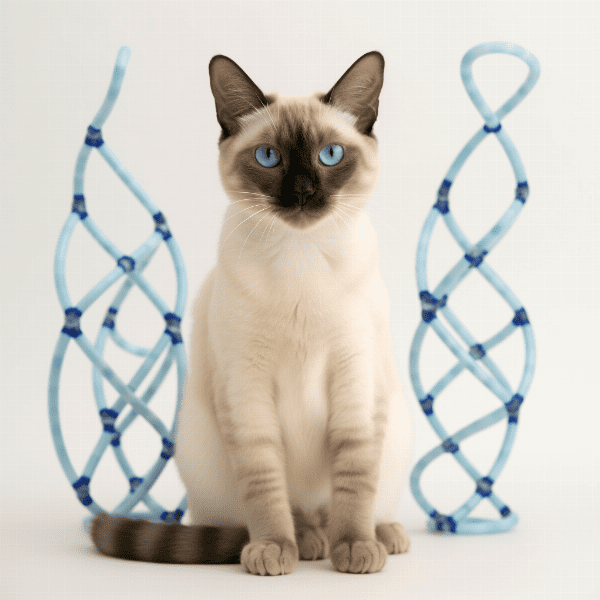
Supporting Siamese Cats with Genetic Disorders
Education and Awareness
Education and awareness are important in supporting Siamese cats with genetic disorders. This includes educating cat owners about the signs and symptoms of genetic disorders, as well as the importance of early diagnosis and treatment.
It is also important to raise awareness about responsible breeding practices and the importance of genetic testing in reducing the risk of passing genetic disorders on to offspring.
Veterinary Care
Regular veterinary care is essential for supporting Siamese cats with genetic disorders. This includes regular check-ups, diagnostic testing, and treatment as needed.
It is important to work closely with a veterinarian who has experience with Siamese cats and genetic disorders, as they can provide guidance and support in managing the cat’s condition and improving their quality of life.
Supportive Care
Supportive care can be an important aspect of supporting Siamese cats with genetic disorders. This can include measures such as providing a comfortable and safe environment, managing pain and discomfort, and providing supportive therapies such as fluids or supplements.
Supportive care can help improve the cat’s quality of life and may even prolong their life in some cases.
Advocacy and Support
Advocacy and support can also be important in supporting Siamese cats with genetic disorders. This includes advocating for increased research funding, supporting organizations that work to improve the health and well-being of cats, and connecting with other cat owners who have experience with genetic disorders.
By working together, cat owners, veterinarians, and advocates can help ensure that Siamese cats with genetic disorders receive the care and support they need to live happy and healthy lives.
In conclusion, supporting Siamese cats with genetic disorders requires education, veterinary care, supportive care, and advocacy and support. By taking a holistic approach to supporting these cats, we can help improve their quality of life and ensure that they receive the care and support they need to thrive despite their genetic conditions.

Coping with the Loss of a Siamese Cat to Genetic Disorders
Grieving Process
Grieving is a natural and important part of coping with the loss of a beloved pet. It is important to allow yourself time to grieve and process your emotions in a healthy way.
This may include talking with family and friends, seeking support from a therapist or support group, or engaging in activities that bring comfort and solace.
Memorializing Your Cat
Memorializing your Siamese cat can be a meaningful way to honor their memory and cope with the loss. This may include creating a memorial or tribute, planting a tree or garden in their memory, or donating to a cat-related charity in their name.
Finding Support
Finding support from others who have experienced the loss of a pet can be helpful in coping with the loss of a Siamese cat to genetic disorders. This may include joining a support group or online forum, connecting with other cat owners who have experienced similar losses, or seeking support from a grief counselor.
Reflection and Celebration
Reflection and celebration can also be helpful in coping with the loss of a Siamese cat to genetic disorders. This may include reflecting on the happy memories shared with your cat, creating a scrapbook or photo album, or planning a celebration of their life.
By focusing on the positive memories and celebrating the life of your Siamese cat, you can help honor their memory and cope with the loss in a healthy way.

Conclusion: The Importance of Understanding Siamese Cat Genetics
Siamese cats are a beloved breed known for their unique coat patterns and striking blue eyes. However, like all breeds of cats, they are susceptible to a range of genetic disorders that can impact their health and well-being. Understanding Siamese cat genetics is essential for maintaining the health and well-being of the breed. In this final section, we will summarize the key points discussed in this post.
Understanding Siamese Cat Genetics
Siamese cat genetics play a critical role in determining the physical traits and susceptibility to genetic disorders in the breed. Understanding Siamese cat genetics is essential for making informed breeding decisions and reducing the risk of passing genetic disorders on to offspring.
Common Genetic Disorders in Siamese Cats
Siamese cats are susceptible to a range of genetic disorders, including PRA, asthma, dental problems, and liver disease. It is important for cat owners to be aware of the signs and symptoms of these disorders and seek veterinary care if needed.
Prevention and Treatment of Genetic Disorders
Prevention and treatment of Siamese cat genetic disorders involves a range of strategies, including responsible breeding practices, genetic testing, environmental management, diet and nutrition, exercise and enrichment, and medication and treatment as needed.
Advances in Siamese Cat Genetic Research
Recent advances in Siamese cat genetic research have led to new treatment and management options for genetic disorders in the breed, including gene therapy, stem cell therapy, and pharmacogenomics.
Coping with the Loss of a Siamese Cat to Genetic Disorders
Losing a Siamese cat to a genetic disorder can be a difficult and emotional experience. Coping strategies may include allowing time to grieve, memorializing your cat, finding support, and reflecting on their life and happy memories.
In conclusion, understanding Siamese cat genetics is essential for maintaining the health and well-being of this beloved breed. By taking a proactive approach to prevention and treatment of genetic disorders, and supporting ongoing research in this area, we can help ensure that Siamese cats remain a healthy and vibrant breed for generations to come.


